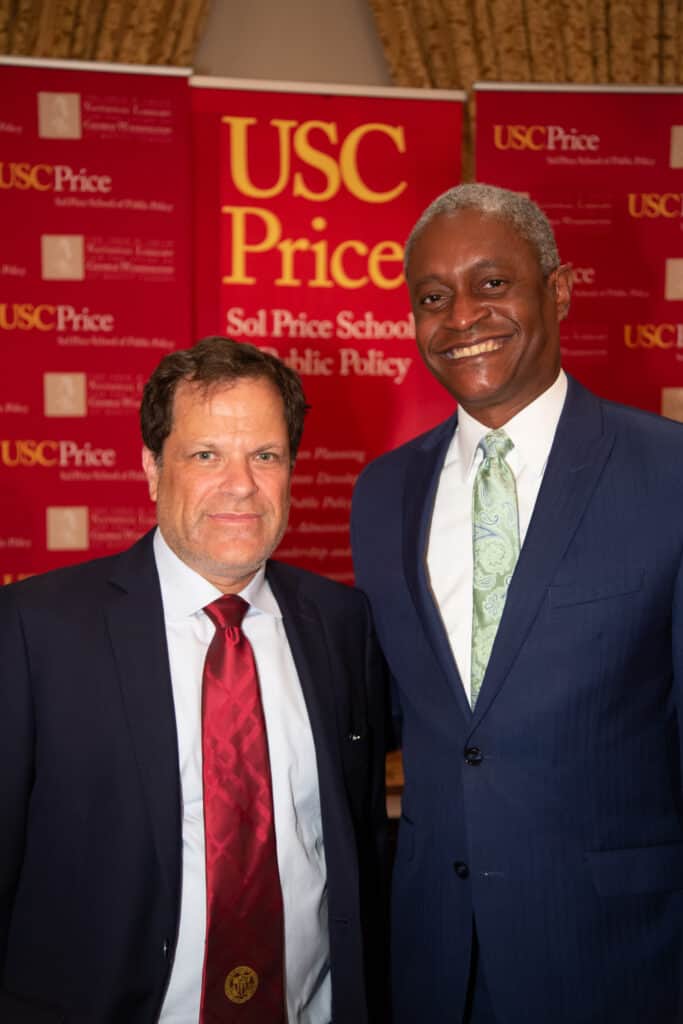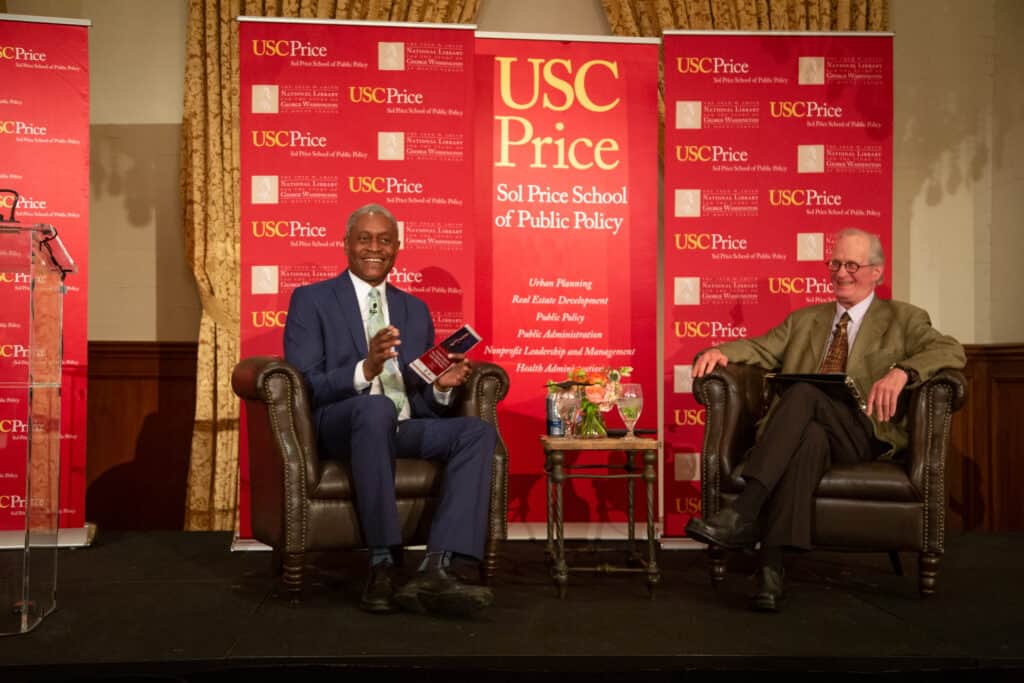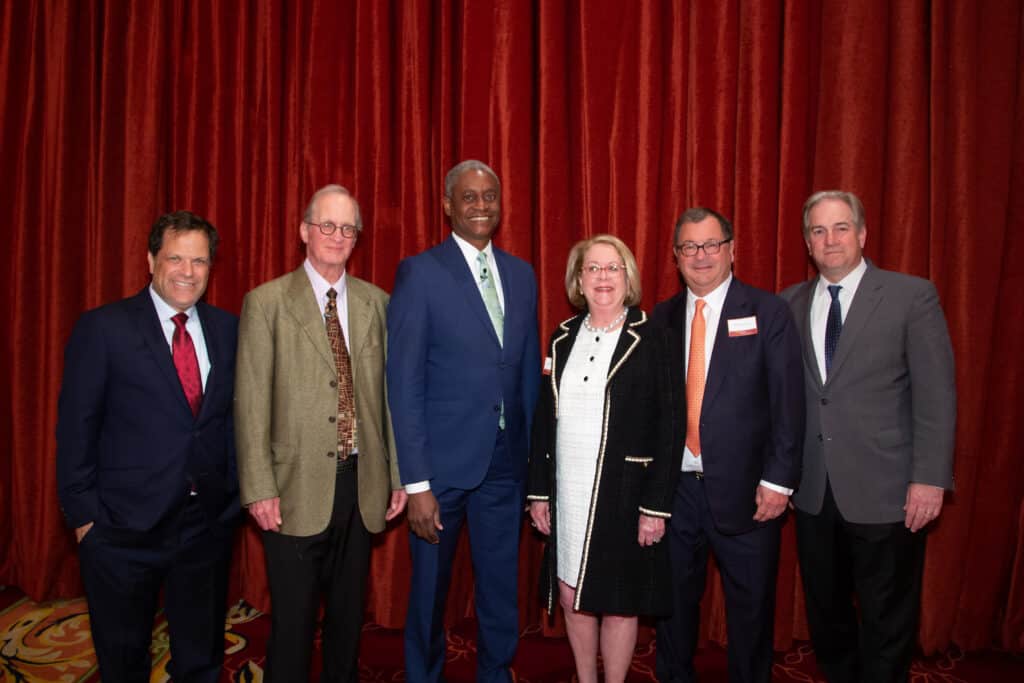Federal Reserve Bank of Atlanta president and CEO Raphael W. Bostic returns to familiar grounds to discuss economic leadership in George Washington Leadership Lecture Series

By Greg Hardesty
Raphael Bostic never used to pose for selfies.
But since he became, in 2017, the first Black and openly gay president and CEO of a regional Federal Reserve Bank, he’s been snapped with admirers in thousands of them.
“People are excited and some of them are inspired, and I feel it’s important to indulge in that positivity and not have my discomfort and wanting to move on to the next thing stop that energy,” said Bostic, who served as chair of the Department of Governance, Management, and Public Policy at USC Price from 2012-2017.
With the ongoing COVID pandemic and, more recently, the war in Ukraine putting the U.S. and global economies on high alert, and with rising inflation here causing grief among consumers and sparking concerns about a possible recession, Bostic, who runs the Federal Reserve Bank of Atlanta, now finds himself in the spotlight more than ever.
On March 29, he covered in nearly 90 minutes a wide range of topics, from the role of the Federal Reserve to the state of the economy and the labor market to his views on leadership as well as career advice for students and young professionals. His remarks were made as he delivered the keynote address at the George Washington Leadership Lecture Series discussion moderated by USC Price Professor David Sloane.

(Photo: Thomas Queally) Full set of images here
Exhibiting the characteristic humility, eloquence and charisma that made him popular at USC, Bostic, after opening remarks by USC Price Dean Dana Goldman, followed a presentation by Douglas Bradburn, president and CEO of George Washington’s Mount Vernon, who spoke about the transformative financial revolution carried out by the first president’s administration.
Back to the future
Just like in 1789, when Washington became president, the nation is gripped in economic uncertainty.
Back then, as Bradburn detailed, Alexander Hamilton, the first secretary of the treasury, launched the country on the road to economic independence by servicing then-crushing debt with interest-bearing treasury bonds, creating an engine for investment and capital and a stable collateral for loans.
Trust was critical in the ability of the Washington administration to raise the nation out of confusion into order, Bradburn said during the presentation, “Economic Leadership from America’s Founding to the Global Pandemic.”
And today, trust in the Federal Reserve is critical to steering the country toward a more stable economy, said Bostic, whose appearance was part of a series of USC Town and Gown events sponsored by the USC Sol Price School of Public Policy and the Fred W. Smith National Library for the Study of George Washington.
Highlights from the George Washington Leadership Lectures Series on “Economic Leadership from America’s Founding to the Global Pandemic.” Watch the full version here: https://youtu.be/wHzm0N4oNZw
“When I talk to bankers, they tell us exactly what they’re seeing because they have confidence that we will take that information and do the things that we think are right,” Bostic said.
He believes “we are very much at a turning point” in terms of how the global economy has functioned for some 40 decades. Businesses that used to produce the most product at the lowest cost with one supplier now are diversifying their supply chains to have multiple suppliers or production locations.
So, costs are going to go up, Bostic explained, but with the benefit of businesses avoiding the volatility and disruption that has come with the pandemic and war in Eastern Europe.

(Photo: Thomas Queally)
“I’m optimistic and scared at the same time,” Bostic said of the “very, very peculiar” time we’re in.
Policies implemented shortly after the pandemic have left the economy in a much stronger position than what was projected, but policymakers will be working to tackle the challenges of the pandemic for some time, Bostic said.
“We have to figure this out,” he said.
As for leadership, Bostic said: “If you’re in the room, you’re supposed to be in the room, and I expect you to contribute when you’re in the room…I believe there’s value for every person, because each person has their own unique experience, and if we leverage those differences and manage them, we’ll get to a much better place.”
As for career advice, Bostic said: “Focus on what you can control” and “be excellent.”
He elaborated: “People won’t see you as panicked. They will see you as focused on the things you can control, and with a confidence that you’re going to get through it – because you are.”